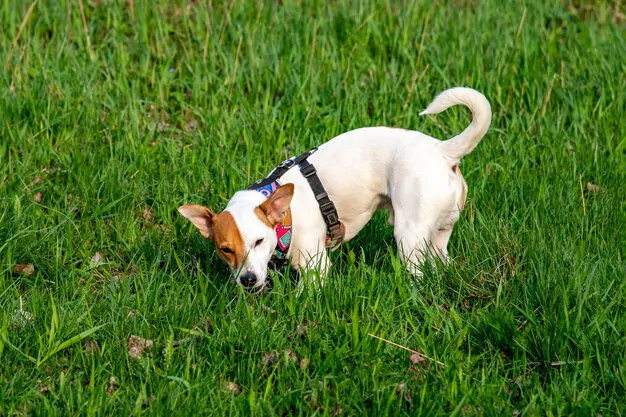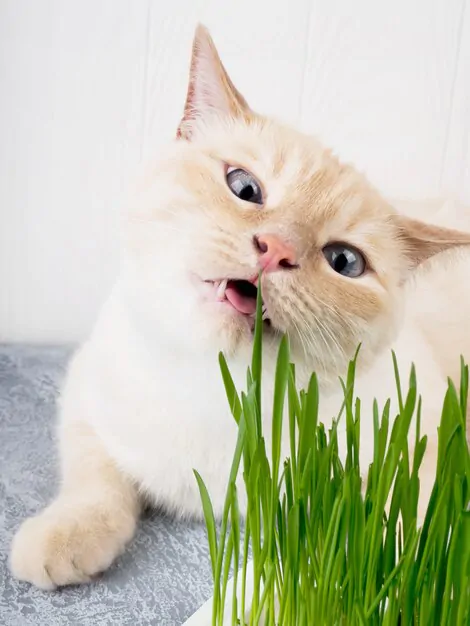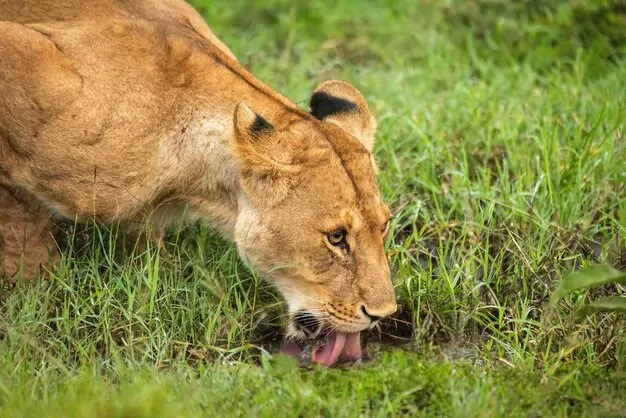Last Updated on July 29, 2024 5:56 pm
Why Do Carnivore Animals Eat Grass? The Scientific Explanation

characteristic of a Graminivore
Have you ever observed your dog or cat munching on grass, only to wonder why these carnivorous pets would engage in such herbivorous behaviour? You’re not alone. This seemingly counterintuitive phenomenon has puzzled pet owners and animal enthusiasts for generations. While your furry friends may appear to be embracing their inner vegetarian, there are actually several scientific explanations for this peculiar habit. In this article, you’ll discover the fascinating reasons behind why carnivores sometimes indulge in grass-eating, from instinctual behaviours to potential health benefits. Prepare to gain a deeper understanding of your carnivorous companions and their occasional green cravings.
Carnivores That Occasionally Eat Grass
The Omnivorous Tendency
While often depicted as strict meat-eaters, many carnivores are actually omnivores that supplement their diets with plant matter. From domestic dogs to large wild cats, a significant number of predatory species have been observed consuming grass and other vegetation. According to a study on ResearchGate, plant material was found in 2-74% of scat and stomach samples from wolves and cougars.
In fact, grass seems to be the plant of choice for many carnivores. Another study cited on ResearchGate noted that 68% of domestic dogs regularly ate grass on a daily or weekly basis. Even our feline companions partake, with the behavior documented in domestic cats as well.
Potential Benefits
But why do these meat-loving predators turn to vegetation? One theory, based on observations of their wild ancestors, is that plant consumption may help purge intestinal parasites or control their burden. As noted on Wikipedia, grass eating in dogs is thought to potentially rid their digestive tract of parasites.
Another possibility is that grass and other plants provide nutrients missing from a strictly carnivorous diet. Certain vitamins, minerals, and fiber could encourage these animals to munch on greens. The ResearchGate study found that signs of illness were rarely observed before plant consumption in dogs and cats, suggesting it is normal behavior unrelated to feeling unwell.
Age and Instinct
Interestingly, the tendency to eat plants seems to diminish with age in domesticated carnivores. According to a research publication on ResearchGate, younger domestic dogs and cats ate grass and other greenery more frequently than their older counterparts. This could indicate an instinctual behavior carried over from the animal’s evolutionary roots.
While the reasons behind this dietary quirk are still being explored, one thing is clear – our carnivorous companions have a taste for greens that belies their reputations as diehard meat-eaters. From wolves snacking on vegetation to Fido munching the lawn, it seems even the fiercest of predators can’t resist the occasional salad.
Reasons Carnivores May Eat Grass
Nutritional Requirements
Eating grass and other vegetation is a natural instinct for many carnivores like cats and dogs. Their wild ancestors consumed entire prey including stomach contents with grass and plants, fulfilling their fiber needs. According to experts, around 11-47% of wolves regularly eat grass, indicating this scavenging behavior is innate.
For domesticated pets on commercial diets lacking roughage, grass provides much-needed fiber. This aids digestion by helping food move smoothly through the intestines and regulating bowel movements. Grass juice is also a good source of folic acid, an essential vitamin that supports cell growth and gut health in carnivores.
Another theory proposes that grass provides nutritional benefits, such as fiber that aids digestion. For cats, grass may act as a supplement by helping move hairballs through the intestines. The varied texture of grass compared to their regular food could also intrigue carnivores, satisfying their natural instinct to explore using senses of taste and texture.
Digestive Aid

Another theory suggests carnivores eat grass to purge their digestive system of indigestible materials like hair, bones, or intestinal parasites. Research shows cats frequently show no signs of illness before eating grass, and only 27% vomit afterward. This behavior likely evolved to help them naturally regulate intestinal parasite levels.
For dogs and cats struggling with an upset stomach or constipation, grass can act as a natural laxative. Its roughage helps break down and pass anything difficult to digest, providing relief. Some experts believe cats lack enzymes to digest grass, so eating it causes vomiting to clear their system.
Instinctual Behavior
One theory suggests that the behavior of eating grass stems from the evolutionary history of carnivores’ wild ancestors. Wild cats would consume grass by eating entire prey, including stomach contents containing partially digested plants. Eating grass may fulfill ancestral instincts in domesticated cats.
Younger carnivores under 3 years old tend to eat more grass than older adults, but vomit less after grazing. This implies the behavior is instinctual from a young age, not necessarily illness-related. Cats and dogs may simply enjoy the taste, texture and act of grazing on tender new spring grass growth.
Boredom or anxiety can also prompt grass-eating as a self-soothing mechanism when pets feel neglected. Providing pots of safe cat grass or increased playtime helps satisfy these natural urges in a healthy way. Overall, moderate grazing is considered safe and normal for carnivores.
Self-Medication
Grass eating could also serve as a form of self-medication for carnivores. Some experts suggest that cats may use grass to relieve discomfort like sore throats or induce vomiting to clear indigestible matter from their system. By consuming grass, carnivores may be attempting to alleviate certain health issues.
Habitual Behavior
For some carnivores, grass eating can become a habitual behavior, especially if started at a young age. According to one source, if a cat feels better after grass consumption, the behavior gets reinforced. Over time, this can lead to a deeply ingrained habit that persists even in the absence of any specific need or benefit.
While the exact reasons behind grass eating in carnivores are not fully understood, these theories provide potential explanations rooted in evolutionary history, nutritional needs, self-medication, and learned behaviors. Further research may shed more light on this intriguing phenomenon.
Is Eating Grass Harmful for Carnivores?

While carnivores like dogs and cats are biologically adapted to derive most of their nutrients from meat and animal-based proteins, occasionally eating grass is generally considered safe in moderation. In the wild, their ancestors may have consumed grasses incidentally while preying on herbivores whose stomach contents included vegetation. This behavior persists as an instinct in some domestic pets.
Potential Benefits of Grass Consumption
Eating grass can provide several benefits for carnivores:
- Fiber Source: Grass contains insoluble fiber which aids digestion and prevents constipation by adding roughage to the diet. Carnivores like dogs may seek out grass to fulfill their need for fiber since their ancestors consumed the entire prey including stomach contents.
- Hairball Management: Cats may eat grass to regurgitate indigestible matter like hair, bones or feathers that have accumulated in their digestive tract. This helps prevent intestinal blockages.
- Nutrient Supplementation: The juice in grass contains small amounts of nutrients like folic acid, which is essential for cats. Eating grass occasionally may help address minor nutritional deficiencies.
- Upset Stomach Relief: Some experts believe grass consumption can induce vomiting in animals feeling nauseous after consuming decaying prey or other indigestible items.
Potential Risks of Overconsumption
However, grass should only supplement a carnivore’s primary meat-based diet rather than replace it entirely. Potential risks of overconsumption include:
- Nutritional Deficiencies: Grass lacks complete proteins, vitamins and minerals required for a carnivore’s optimal health and development when eaten in excess.
- Intestinal Blockages: Eating too much grass can potentially lead to gastrointestinal obstructions requiring veterinary care.
- Toxin Exposure: Lawns treated with herbicides, pesticides or contaminated by fecal matter may contain toxins harmful to carnivores if consumed.
As long as it’s an occasional treat from a safe source and doesn’t replace a nutritious, balanced diet, moderate grass consumption is likely harmless for most healthy carnivores. Pet owners should monitor this behavior and consult a veterinarian with any concerns.
FAQs: Answering Common Questions About Carnivores Eating Grass
Why do carnivores eat grass?
Carnivores eating grass may seem counterintuitive, but there are several reasons why they engage in this behavior. The primary motivation is to aid digestion and expel indigestible materials like fur, bones, and feathers from their gastrointestinal tract. As explained on Reddit, the grass helps cough up these materials and facilitates the passage of hairballs or other obstructions.
Additionally, grass provides fiber and roughage that can help regulate bowel movements and alleviate digestive discomfort. Some experts, like those cited on NOLA.com, suggest that carnivores may instinctively eat grass when experiencing nausea or an upset stomach, as it can induce vomiting and provide relief.
Do carnivores get nutritional benefits from eating grass?
While grass itself has little nutritional value for obligate carnivores like cats and dogs, it can provide essential vitamins and minerals to supplement their primarily meat-based diets. For example, as noted on Reddit, tigers will consume soft grasses, succulent plants, and fruits to obtain additional vitamins and minerals.
However, it’s important to note that most domesticated carnivores lack the necessary enzymes to fully digest and absorb nutrients from plant matter. Therefore, grass consumption is primarily driven by instinctual behaviours rather than a direct nutritional need.
Are there any risks associated with carnivores eating grass?
While grass-eating behaviour is generally harmless, there are potential risks to be aware of. One concern is the ingestion of lawn chemicals, pesticides, or toxic plants, which can be harmful if consumed in significant quantities. As VCA Hospitals advises, owners should monitor their pets’ grass-eating habits and consider training them to avoid areas treated with chemicals or potentially toxic plants.
Additionally, excessive or persistent grass-eating could indicate an underlying medical condition or nutritional deficiency. In such cases, veterinary experts recommend seeking professional advice to rule out any potential health issues and address the root cause of the behaviour.
As you’ve learned, the occasional grass-eating behaviour of carnivores is a complex phenomenon with multiple potential explanations. Whether it’s to aid digestion, obtain missing nutrients, induce vomiting, or simply out of instinct or boredom, this seemingly odd behaviour serves important purposes for many carnivorous species. While more research is needed to fully understand all the reasons behind it, you can now appreciate that grass consumption by meat-eaters isn’t as unusual or concerning as it may appear. The next time you observe your dog or cat nibbling on grass, you’ll have a deeper understanding of the possible motivations behind this intriguing carnivore quirk.


